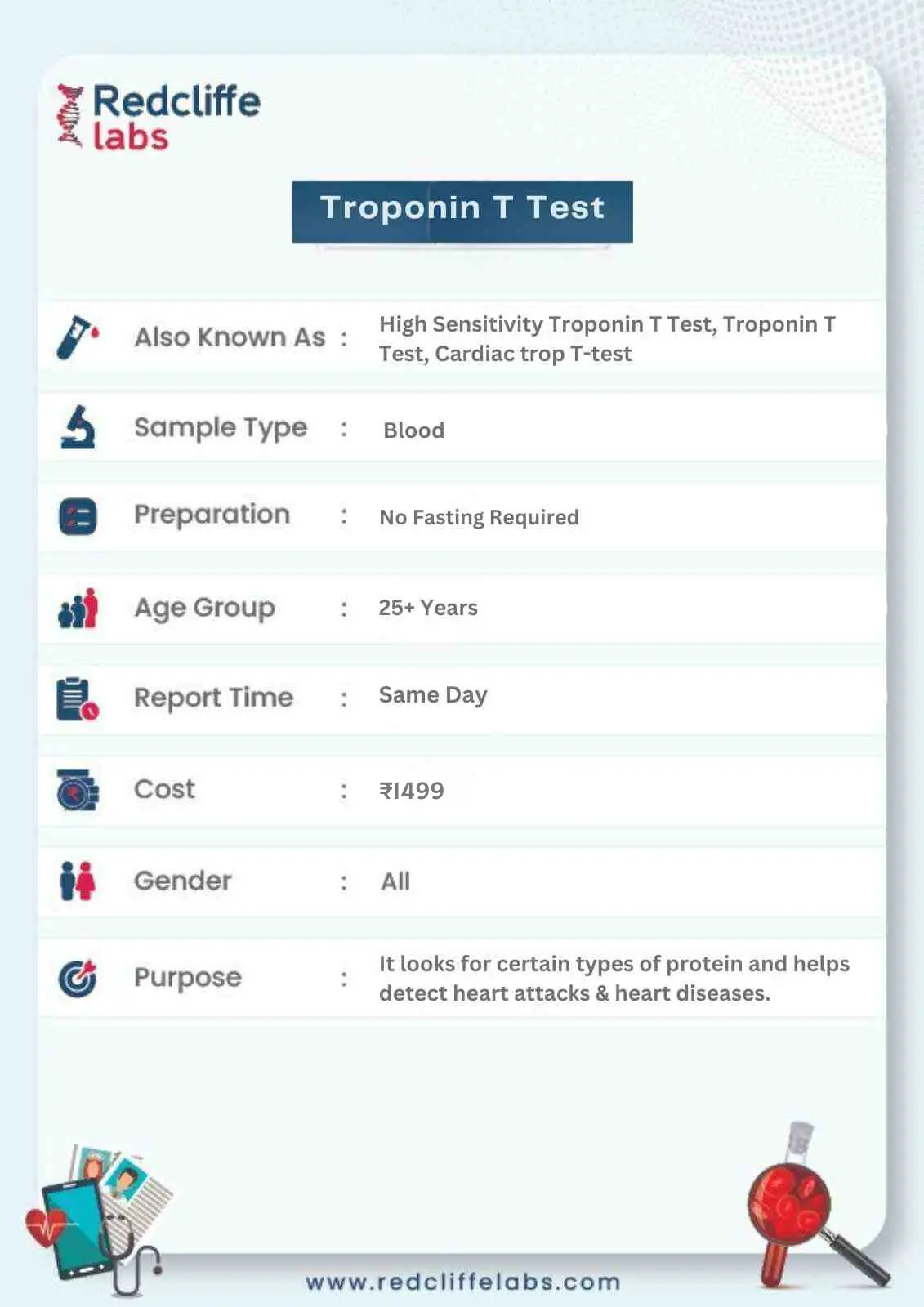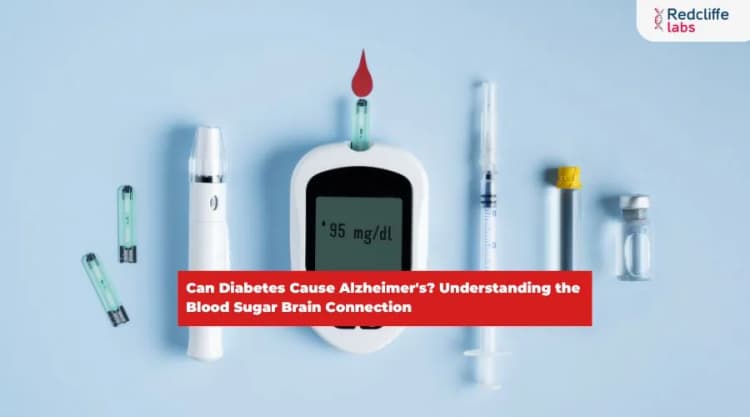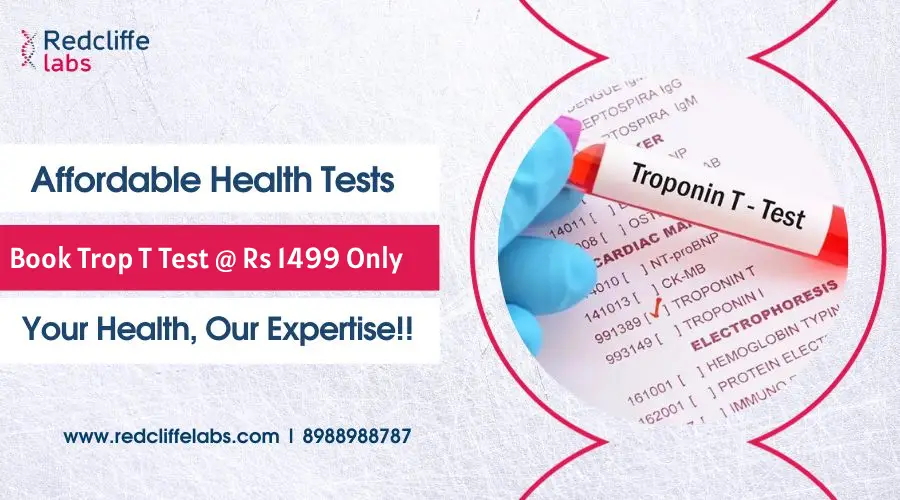The High Sensitivity Troponin T Test is an advanced ...Read more
Blood
Unlock special
discount on
this package
Login to Unlock 🔓
Also Known As
HS Troponin T, HS Trop T, HSTrop, HSTrponinNABL Accredited lab*

Booking Benefits Unlocked Worth FREE 799

Report Consultation

Diet Plan
*Available once your report is generated.
At Redcliffe Labs, we have a single goal: to give India its right to quality diagnostics.
Customers served
Tests Processed Everyday
Cities
Collection Centres
World Class In-house Labs
Home Collection Experts
1 Test Parameters
High Sensitivity Troponin T
1 PARAMETER INCLUDED
1 PARAMETER INCLUDED
- Troponin T, Quantitative
Helps you know your test better
Who should take the Troponin T Quantitative Test?
- Individuals experiencing symptoms of a heart condition, such as chest pain, discomfort, shortness of breath, or rapid heartbeat, should take the test for accurate diagnosis.
Why take the Troponin T Quantitative Test?
- Your doctor may ask you to take the test to diagnose and assess potential heart damage. This test helps healthcare professionals determine whether your heart muscle has been injured so that timely and appropriate treatment can be initiated.
What are the benefits of the Troponin T Quantitative Test?
- Detects even minor heart muscle damage
- Provides a precise measure of the extent of heart muscle injury
- Monitors the progress of heart damage and treatment effectiveness
- Assesses the risk of future cardiac issues
Top Booked Health Checkup Packages
Reports in 12 hours
|Parameters 94
Reports in 12 hours
|Parameters 89
Reports in 12 hours
|Parameters 96
Reports in 12 hours
|Parameters 96
Reports in 12 hours
|Parameters 90
Verified by Medical Expert

WRITTEN BY
Sheena Mehta

MEDICALLY REVIEWED BY
Dr. Pradeep Lodha
Table of Content
Introduction to Troponin T Test
Troponin is a protein found in the skeletal and cardiac muscle tissue. It plays an important role in muscle contraction. Troponin is released into the blood when there is damage to the heart muscle. High levels of troponin in the blood indicate heart muscle damage like heart attack. Troponin testing helps to diagnose and assess cardiac health. There are three subunits of troponin: troponin C, troponin I, and troponin T. The Cardiac trop T test allows for the early detection of heart muscle damage, often before symptoms are noticeable. Your doctor may recommend a troponin test if you are having chest pain, a suspected heart attack, or shortness of breath and monitor your heart condition to check whether there is heart muscle damage. You can take a Troponin T test from Redcliffe Labs if you are experiencing any heart-related issues or discomfort. We will provide you with accurate test reports on time. You can book your Cardiac trop T test online, and our phlebotomist will come to your home to collect the sample.
Test Details:
| Also Known As | High Sensitivity Troponin T Test, Troponin T Test, Cardiac trop T-test |
| Purpose | It looks for certain types of protein and helps detect heart attacks & heart diseases. |
| Preparation | Do not take any over-the-counter medicine without confirming with your Doctor. |
| Fasting | No Fasting Required |
| Get Reports Within | Within 15 hours |
| Cost | INR 1499 |

What is Troponin?
Troponin is a protein present in some types of muscle in your body. In normal circumstances, this protein exists inside muscle cells and only circulates in your blood in tiny amounts. However, damage in muscle cells can cause more troponin to escape into your blood.
Two types of troponin protein are detectable after heart muscle damage. A healthcare professional denotes them with the letters I and T.
- Troponin I- This is a unique troponin only found in the heart muscle.
- Troponin T- This type is present in heart muscles and other muscles. However, the amount is very limited. The troponin T has a unique structure, which isn’t present anywhere else in the body.
What is the Meaning of the Trop T Test?
The Trop T-test aims to detect the protein troponin released into the bloodstream when heart muscle cells are damaged. A high level of troponin in your blood indicates heart damage. Your healthcare professional can use the test to determine the severity of a heart attack.
Did You Know?
Troponin levels begin to rise within 3 to 12 hours after a heart attack and can remain elevated for several days.
Purpose of the Troponin T Test
The Troponin T test is used to measure the levels of Troponin T found in the heart muscle cells. The primary purpose of the Cardiac trop T-test is to diagnose heart-related conditions. Here are the main purposes of the Troponin T test:
- Diagnosis of Myocardial Infarction (Heart Attack): Troponin T levels rise in the blood when there is damage to the heart muscle, as occurs during a heart attack. High levels of Troponin T levels help to identify a heart attack.
- Risk Assessment: The Troponin T test can help assess the severity of a heart attack, guiding treatment decisions and risk stratification.
- Monitoring Cardiac Conditions: For patients with known cardiac conditions, such as unstable angina or heart failure, the Troponin T test may monitor changes in heart muscle function over time.
- Evaluation of Chest Pain: The Trop T test helps to assess the cause of chest pain, and the Troponin T test can help determine whether the pain is due to cardiac causes or other non-cardiac issues.
- Assessment After Cardiac Procedures: Troponin T levels are recommended after cardiac procedures like angioplasty or stent placement to check for any procedure-related complications or ongoing cardiac damage.
What does the Troponin T Test measure?
The test measures the amount of Troponin T in the blood. The high level of Troponin T in the blood may indicate damage to heart muscle cells. The primary purpose of the Troponin T test is to diagnose and assess heart-related conditions, particularly to identify myocardial damage, such as in the case of a heart attack. Troponin T is the protein released into the blood when there is injury or damage to the heart muscle. These proteins are highly specific to the heart, and their presence in the blood is a key marker for diagnosing acute coronary syndromes, particularly myocardial infarction. The high troponin levels in the blood can persist for several days after a heart attack, which makes troponin tests an important test to diagnose and assess heart-related conditions.
What are the benefits of the Troponin T Quantitative Test?
Benefits of the Troponin T. Quantitative Test include:
- Detects even minor heart muscle damage
- Provides a precise measure of the extent of heart muscle injury
- Monitors the progress of heart damage and treatment effectiveness
- Assesses the risk of future cardiac issues.
- The test also pinpoints the severity of your existing heart disease. This information helps your doctor understand the problem and offer personalized treatment plans.
What are the uses of the Troponin T Test?
A troponin T quantitative test is used to check certain types of the protein troponin in your blood, causing heart muscle damage. Hence, a doctor suggests checking for troponin to diagnose heart attacks and other heart problems. Some of its uses include:
- To confirm if you have a heart attack: One primary use is when a healthcare provider suggests a troponin T quantitative test when he suspects heart attack symptoms, such as chest pain or shortness of breath.
Additionally, chest pain is the most common symptom of a heart attack, causing discomfort or heaviness. However, women might not experience pain in their chest as an initial sign of a heart attack. Other symptoms include:
- Fatigue
- Shortness of breath
- Sleeping disorders
- Nausea or discomfort
- Vomiting
- Sweating
- To diagnose and monitor unstable angina: Your doctor may also suggest a troponin T quantitative test to check for unstable angina. This condition indicates chest pain that can occur at any time, even when you are resting, and may cause a heart attack.
A troponin T quantitative test is needed when angina has been present for a long time. The doctor suspects that the situation is getting worse.
- Checks heart health before and after surgery: A troponin test is sometimes performed before or after surgery to check for improvement and compare the results.
- Heart attack long-term outcome: When a doctor wants to follow your recovery from your heart attack, they are likely to suggest a troponin test. Higher-than-normal troponin levels indicate another heart attack or other problems.
- Heart failure: Sometimes, the symptoms of heart failure are not visible, but the doctor suspects heart failure. Hence, he suggests a troponin test to confirm the diagnosis. If you have heart failure, the test helps doctors determine whether you need hospitalization.
- A pulmonary embolism occurs when a clot develops in an arm or leg and passes through the veins to the lungs. Hence, a doctor suggests this test to detect the condition.
- Pulmonary arterial hypertension (PAH) is a broader condition that indicates high lung blood pressure. This can further press on the heart and cause heart failure. Hence, a doctor may use a troponin test to diagnose PAH.
- Chronic Kidney Disease (CKD): A chronic kidney disease is likely to damage your heart muscle, causing an increase in the troponin level. A healthcare professional must track your troponin levels to learn whether you are at risk of heart problems or heart attacks.
- People without symptoms: Sometimes, a troponin test becomes even more crucial when you are over 65 and no symptoms of heart disease appear. If your troponin test report shows a 50% increase in the troponin level, it indicates you are at risk of heart failure.
Note: Discuss your reports with your healthcare provider. Additional tests may also be needed to confirm the status and begin treatment, including medicines, lifestyle changes, a balanced diet, and exercise.
Troponin T-Test Normal Range
The normal ranges for the troponin T test, according to the American Board of Internal Medicine, are measured in nanograms per milliliter (ng/mL).
Here is a chart depicting the trop T-test normal range.
| Category | Normal Range |
| Troponin I | Less than or equal to 0.04 ng/mL |
| Troponin T | Less than or equal to 0.01 ng/mL |
| High-sensitivity Troponin I for Females | Less than or equal to 15 nanograms per liter |
| High-sensitivity Troponin I for Males | Less than or equal to 20 nanograms per liter |
| High-sensitivity Troponin T for Females | Less than or equal to 10 nanograms per liter |
| High-sensitivity Troponin T for Males | Less than or equal to 15 nanograms per liter |
Why Do You Need the Trop T-Test?
The Troponin T test is ordered when there is a suspicion of muscle damage or a medical emergency, like a heart attack. The following are the signs indicating the need for the trop T-test.
- Chest pain or discomfort
- Pain radiating in other areas
- Shortness of breath
- Nausea and vomiting
- Lightheadedness or Fainting
- Severe sweating
- Anxiety
- Sudden fatigue or weakness
- Chronic Fatigue
The high-sensitivity Troponin T test, along with other essential diagnostics, provides a comprehensive heart health evaluation. If you have any of the symptoms listed above, consult a doctor to prevent complications.
What Does the Troponin T Test Detect?
The test can detect:
- Heart attack long-term outcome
- Unstable angina
- Heart failure
- Pulmonary embolism
- Pulmonary arterial hypertension (PAH)
- Chronic kidney disease (CKD)
- Heart surgery follow-up
Preparation for the Troponin T Test
The troponin T (TnT) test does not require any specific preparation. However, there are some general guidelines to keep in mind:
- Consult with your Doctor: Discuss your medical history with your doctor, including medications, supplements, or recent diseases, as these factors can affect the test results.
- No Fasting Required: Unlike other blood tests, the Troponin T test does not require fasting. You can eat and drink as usual.
- Relax: Reducing stress and anxiety before the test can help ensure more accurate results, as stress can affect heart rate and blood pressure.
The procedure of the Troponin T Test
The Troponin T test does not require any special preparation. Your doctor may order the Troponin T test based on the symptoms, medical history, and clinical evaluation. The phlebotomist will collect the blood sample from a vein in the arm. He will clean the arm area first with an antiseptic and then use a needle to draw the blood into a vial or syringe. You will feel a little pain or discomfort during the procedure, but this is normal. After drawing the blood sample, the phlebotomist will place a cotton ball over the puncture site.
Risks Associated with the Troponin T Test
The Troponin-T test is a blood test that may have minor risks, which can be:
- Slight pain
- Several punctures
- Lightheadedness
- Infection
- Blood loss
What do the Troponin T Test results indicate?
The Cardiac trop T test reports of the Troponin T test will be available 15 hours after the test. The test results show the following results:
- Normal Levels: Normal troponin T levels indicate no significant damage to the heart muscle.
- High Levels: Elevated troponin T levels indicate damage to the heart muscle. The most common cause of elevated troponin T is a heart attack (myocardial infarction). When a heart attack occurs, damaged heart muscle cells release troponin T into the blood. The high level of Troponin T may indicate:
- Heart attack
- Kidney disease
- Heart failure
- Myocarditis or pericarditis
- Sepsis
- Pulmonary embolism
- Rapid heartbeat
- Congestive heart failure
- Inflammation of the heart muscle
- Heart muscle disorders, such as cardiomyopathy
- Irregular heart rhythm
- Sepsis
- Stroke
- Extreme emotional strain, such as stress or grief
- Chemotherapy
- Exercising too much or too strenuously
- Prolonged exercise
Can High Troponin Levels Occur Without a Heart Attack?
Yes, troponin levels can rise even if you haven’t had a heart attack. Several other medical conditions can cause elevated troponin, including:
- Heart surgery
- Chest injuries
- Chronic kidney disease
- Pulmonary embolism
- Sepsis
- Intense exercise
- Chronic obstructive pulmonary disease (COPD)
- A severe COVID-19 infection
Other conditions that can also cause elevated troponin levels include:
- Heterophilic antibodies
- Rheumatoid factor
- Fibrin clots
- Equipment malfunction
- Stress-induced myocardial stunning, also known as 'broken heart syndrome
- Rising Levels: In the condition of a heart attack, the troponin levels start rising several hours after the symptoms and can remain high for several days. Rising troponin levels can indicate ongoing damage to the heart.
- Falling Levels: A decrease in troponin levels can be a sign that the heart muscle is healing and that the damage is not progressing. This is a positive sign during recovery from a heart attack.
The troponin levels can also be elevated in conditions other than heart attacks, such as:
- Heart-related conditions like myocarditis, pericarditis, or congestive heart failure.
- Non-cardiac conditions, including pulmonary embolism, kidney disease, or severe sepsis.
To sum up, the Troponin-T test positive means damage to your heart muscle. Beyond this, certain other causes of Troponin T test positive include:
- Heart damage
- Heart attack
- Myocarditis
- Coronary artery spasm
- Cardiomyopathy
- Long-term kidney disease
- Pulmonary embolism
- Congestive heart failure
A negative Trop T test indicates no significant damage to your heart muscle. However, since troponin levels can take several hours to rise after a heart attack, the test may produce a false negative if done too soon. To ensure an accurate diagnosis, your doctor may recommend repeating the test or conducting additional tests.
Your troponin levels can increase because of some medical procedures. These include:
- Cardiac angioplasty/stenting
- Heart defibrillation or electrical cardioversion
- Radiofrequency ablation of the heart
What Else You Should Know About a Trop T Test?
It’s important to know that high troponin T levels don’t always mean heart muscle damage or heart failure. Your doctor may recommend additional tests to confirm the cause, such as:
- Angiogram
- Echocardiogram
- Chest x-ray
- Cardiac computed tomography (CT) scan
- Electrocardiogram (ECG or EKG)
- Cardiac magnetic resonance imaging (MRI)
How to Lower Troponin Levels?
An effective way to lower your troponin levels is by addressing the cause and making lifestyle changes. Treatment for a positive Troponin T test includes:
- Identify the Cause: The first step in treatment is identifying the underlying cause, which may include a heart attack, heart failure, or another medical condition.
- Make Lifestyle Modifications: Your lifestyle has a direct impact on your health. Therefore, incorporate healthy practices, like avoiding tobacco consumption, regular exercise, eating a nutritious diet, and maintaining a healthy weight.
- Medications: Certain medications, such as statins, vitamin C, and beta-blockers, may lower troponin levels.
Treatment for a Positive Troponin T Test
A trop T-test positive treatment depends on its severity and cause. Treatment options may include:
- Oxygen Therapy
- Nitroglycerine
- Surgery
- Medications
- Cardiac Catheterization
- Medications to manage conditions like high blood pressure, diabetes, and high cholesterol.
- Some lifestyle modifications include losing weight, exercising, and eating healthy.
Why Do Doctors Recommend Troponin T Test?
Your Doctor may recommend the troponin T test if you are suspected of heart muscle damage or other heart-related problems. The Trop T-test is commonly recommended in the following situations:
- Chest Pain: If you have severe chest pain in the chest, doctors may order a troponin T test to help detect if the pain is due to a heart attack or another cardiac condition.
- Suspected Heart Attack: Troponin tests are often used in emergency rooms to diagnose a heart attack. High troponin levels indicate heart muscle damage.
- Shortness of Breath: If a patient experiences sudden shortness of breath, a troponin test will be recommended to assess potential heart-related risks.
- Monitoring Cardiac Conditions: Patients with known heart conditions, such as angina or heart failure, may have troponin tests ordered to monitor their heart health over time.
- Non-cardiac Conditions: Troponin levels may be high in certain non-cardiac conditions, such as pulmonary embolism or kidney disease. Doctors may use troponin tests to rule out or confirm heart involvement in these cases.

Who is at Risk of Heart Disease?
There are different categories of people who are at risk of certain heart diseases. Some of the key risk factors for heart disease include:
- Men aged 45 and older and women aged 55 and older are at higher risk.
- Family history
- Smoking
- High Blood pressure
- High Cholesterol
- Diabetes
- Obesity
- Physical Inactivity
- Unhealthy Diet
- Stress
- Excessive Alcohol Consumption
- Sleep Apnea
- Peripheral Artery Disease (PAD)
- Rheumatoid Arthritis and Lupus
Regular check-ups can assess and manage people's risk factors for heart disease. Additionally, early detection and intervention play a significant role in preventing heart disease and its complications.
What are the symptoms of Heart Related Diseases?
Heart-related diseases include coronary artery disease, heart failure, arrhythmias, and more. Symptoms can vary depending on the specific condition, but some common symptoms of heart-related diseases include:
- Chest Pain or Discomfort: Often described as angina, chest pain can manifest as pressure, tightness, squeezing, or aching in the chest. It may radiate to the arms, neck, jaw, shoulder, or back.
- Shortness of Breath: Difficulty breathing during physical activity or lying down can indicate heart issues, such as heart failure or coronary artery disease.
- Fatigue: Unusual and extreme tiredness or fatigue, even with minimal exertion, is a common symptom in heart-related diseases.
- Rapid Heartbeat: An irregular or fast heartbeat can indicate arrhythmias, heart failure, or other heart conditions.
- Swelling: Swelling in the ankles, legs, abdomen, or other body parts may be a symptom of heart failure.
- Dizziness or Lightheadedness: Feeling dizzy or lightheaded can occur due to arrhythmias or low blood pressure, which can be related to heart conditions.
- Fainting: Passing out or fainting can result from an arrhythmia or other heart-related causes.
- Nausea and Vomiting: Some heart conditions can lead to feelings of nausea and, in some cases, vomiting.
- Irregular Heartbeat: Fluttering, palpitations, or irregular heart rhythms can be related to arrhythmias, such as atrial fibrillation.
- Cough: A persistent cough that produces pink, frothy mucus can be a symptom of heart failure.
- Sleep Disturbances: Waking up at night due to shortness of breath or a feeling of suffocation can be related to heart failure.
If you are experiencing any of these symptoms, persistent or severe, it's important to seek prompt medical attention. Early diagnosis and intervention can significantly improve the risk of heart-related diseases.
The Troponin T test price at Redcliffe labs
The Trop T test price at Redcliffe Labs is INR 1499. You can book your test with us at affordable prices and take advantage of various discounts and offers. We ensure you provide the best diagnostic services experience. Book your Trop T test online, and our phlebotomist will be on time at your doorstep to collect the blood sample. We ensure to provide you with the Troponin T test reports on time. So what are you still waiting for? Book your Top T-sensitive test today!
Troponin Test Cost in Different Cities
| City Name | Discounted Price |
| Delhi | ₹1499 |
| Noida | ₹1499 |
| Mumbai | ₹1499 |
| Bangalore | ₹1499 |
| Kolkata | ₹1499 |
| Pune | ₹1499 |
| Lucknow | ₹1499 |
| Ahmedabad | ₹1499 |
| Hyderabad | ₹1499 |
| Chennai | ₹1499 |
| Gurgaon | ₹1499 |
| Jaipur | ₹1499 |
| Faridabad | ₹1499 |
| Indore | ₹1499 |
| Patna | ₹1499 |
Other Heart & Cholesterol Tests/Packages That You Can Book with Redcliffe Labs
| Tests/Packages | Price in Rs. |
| Cholesterol Test | ₹250 |
| HDL Cholesterol Direct Test | ₹360 |
| LDL Cholesterol Direct Test | ₹400 |
| Cholesterol Profile | ₹350 |
| Healthy Heart Package | ₹1299 |
| High Sensitivity Troponin T Test | ₹1499 |
| Healthy Heart Advance Package | ₹1699 |
| Healthy Heart Premium Package | ₹4199 |
Troponin T Test: A Lifesaving Diagnostic Test
The troponin T test is an indicator of heart muscle damage and helps to diagnose heart attacks. The test measures the cardiac troponin T levels in the bloodstream. Elevated Troponin T levels are a clear sign of cardiac injury, providing insights into the extent of heart muscle damage. This information helps healthcare professionals in making timely and accurate diagnoses, which, in turn, allows for prompt intervention and treatment. Furthermore, the Cardiac trop T-test isn't limited to diagnosing heart attacks alone. It is used to assess heart-related conditions, including heart failure, myocarditis, pericarditis, and more. Consult with your doctor and take the Troponin T test in case you are experiencing any symptoms and discomfort in your heart. Early diagnosis and treatment of heart attacks can save lives and reduce long-term complications.
5 Simple Steps to Manage Your Health with Redcliffe Labs
Quick, Simple & Convenient; trusted care delivered to your doorstep.

Start Your Online Booking
Open the Redcliffe Labs website/app. Select the test or package and enter your details. Schedule the service for your preferred slot.

Live Tracking
Stay updated with real-time tracking for a smooth and timely home sample collection.

Sample Collection
Our certified experts ensure a smooth, hygienic, and fully compliant sample collection experience.

Doctor-Verified Smart Reports
Every report is clinically checked by expert doctors and shared with smart, actionable insights.

Your Health Journey Continues Post Reports
Consult with our expert medical team to get actionable insights to improve your health.
Nearby Labs(9)
Redcliffe Labs Noida

MC-5280
Redcliffe Collection Center
Redcliffe Collection Center
Redcliffe Collection Center
Redcliffe Collection Center
Redcliffe Collection Center
Redcliffe Collection Center
Redcliffe Collection Center
Redcliffe Collection Center
Frequently Asked Questions
What is the troponin T test for?
What is the Cost of trop T test?
What is a normal troponin T level?
Can troponin detect heart blockage?
Does troponin confirm a heart attack?
What is a 3-hour troponin rule?
How can I lower my troponin levels naturally?
Can anxiety raise troponin levels?
Can I book a High Sensitivity Troponin T Test near me?
Can I book a home collection for a High Sensitivity Troponin T Test?
Health Articles & Blogs
My Health
Stay informed with our expert health articles and blogs. Explore comprehensive guides on diseases, nutrition, preventive care, and wellness tips to help you make better health decisions.
Can Exercise Really Treat Depression? What Research Says
Discover what research says about exercise and depression. Learn how physical activity may improve mood, reduce symptoms, and support mental health.

Is It Good to Eat Dried Cranberries Every Day? Benefits & Risks
Discover the health benefits and potential risks of eating dried cranberries every day, including sugar levels and portion tips.

7 Health Screenings Every Woman Above 30 Should Get Done Annually

Fat vs Muscle: Are they Different?

Can Managing High Blood Pressure Lower Uterine Fibroid Risk?

Debunking Epilepsy Myths: What Everyone Should Know

Can Diabetes Cause Alzheimer's? Understanding the Blood Sugar Brain Connection
Explore the link between diabetes and Alzheimer’s disease. Learn how high blood sugar may affect brain health, memory, and long-term cognitive function.

Pimples on Scalp: Causes, Treatments, and Prevention Tips
Explore My Health

